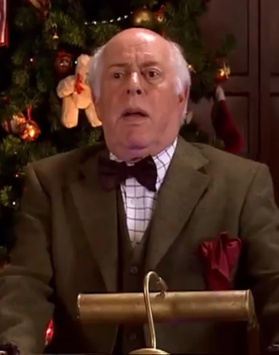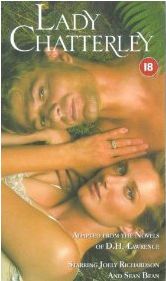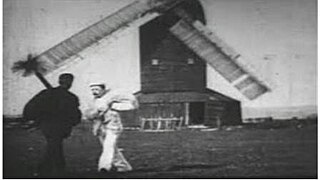Related Research Articles

Henry Kenneth Alfred Russell was a British film director, known for his pioneering work in television and film and for his flamboyant and controversial style. His films were mainly liberal adaptations of existing texts, or biographies, notably of composers of the Romantic era. Russell began directing for the BBC, where he made creative adaptations of composers' lives which were unusual for the time. He also directed many feature films independently and for studios.

Bruce Robinson is an English actor, director, screenwriter and novelist. He wrote and directed Withnail and I (1987), a film with comic and tragic elements set in London in the late 1960s, which drew on his experiences as a struggling actor, living in poverty in Camden Town.

Clive Walter Swift was an English actor and songwriter. A classically trained actor, his stage work included performances with the Royal Shakespeare Company, but he was best known to television viewers for his role as Richard Bucket in the BBC sitcom Keeping Up Appearances. He played many other television and film roles.

Kenneth Colley is an English film and television actor whose career spans over 60 years. He came to wider prominence through his role as Admiral Piett in the Star Wars films The Empire Strikes Back (1980) and Return of the Jedi (1983).
Isadora Duncan, the Biggest Dancer in the World is a BBC Television film based on the life of the American dancer Isadora Duncan first broadcast on 22 September 1966. The film was directed and produced by Ken Russell and written by Sewell Stokes and Russell. It starred Vivian Pickles and Peter Bowles.
Elgar is a British drama documentary made in 1962 by the British director Ken Russell for BBC Television's Monitor series. It dramatised in vigorous style the life of the English composer Sir Edward Elgar.

Lady Chatterley is a 1993 BBC television serial starring Sean Bean and Joely Richardson. It is an adaptation of D. H. Lawrence's 1928 novel Lady Chatterley's Lover, first broadcast on BBC1 in four 55-minute episodes between 6 and 27 June 1993. A young woman's husband returns wounded after the First World War. Facing a life with a husband now incapable of sexual activity she begins an affair with the groundskeeper. The film reflects Lawrence's focus not only on casting away sexual taboos, but also the examination of the British class system.
Monitor was a British arts television programme that was launched on 2 February 1958 on BBC and ran until 1965.

The Miller and the Sweep is a 1898 British short black-and-white silent comedy film, directed by George Albert Smith, featuring a miller carrying a bag of flour fighting with a chimney sweep carrying a bag of soot in front of a windmill, before a crowd comes and chases them away. The film, according to Michael Brooke of BFI Screenonline, "was one of the first films made by G.A. Smith, shortly after he first acquired a camera," and is also, "one of the earliest films to show a clear awareness of its visual impact when projected."
Othello is a 1990 film produced by the Royal Shakespeare Company, starring Ian McKellen, Willard White, Imogen Stubbs, and Zoë Wanamaker. It is based on a stage production of William Shakespeare's play Othello, directed by Trevor Nunn, and later rethought for TV and filmed in a studio. It was shot in a black box theater, so minimal props or scenery were needed, and aired 23 June 1990 on Theatre Night.
Sailors Three is a 1940 British war comedy film directed by Walter Forde and starring Tommy Trinder, Claude Hulbert and Carla Lehmann. This was cockney music hall comedian Trinder's debut for Ealing, the studio with which he was to become most closely associated. It concerns three British sailors who accidentally find themselves aboard a German ship during the Second World War.

Our New Errand Boy is a 1905 British short silent comedy film, directed by James Williamson, about a new errand boy, engaged by a grocer who soon regrets the appointment. This "relatively unambitious" chase comedy, according to Michael Brooke of BFI Screenonline, "is one of a number of Williamson films featuring a mischievous child, played by the director's son Tom." "Although essentially a series of sketches," this film, according to David Fisher, "demonstrates the extent to which Williamson had developed film technique For a start, the film has a title frame, which includes the logo of the Williamson Cinematograph Company," and, "the chase section anticipates the American comedies of the next decade."

Comic Costume Race is an 1896 British short black-and-white silent actuality film, directed by Robert W. Paul, featuring comic costume scramble at the Music Hall Sports on 14 July 1896 at Herne Hill, London. The music hall sports day was an annual charity event consisting of other events such as egg and spoon races and three-legged races. The film is the best surviving pictorial record of the Music Hall Sports. It is not known who the race participants are.
Kenneth Jones was a British conductor and composer of film and television music. Among his work Jones was musical director for the television chat show Aspel & Company and wrote the scores for several comedy films.
Dance of the Seven Veils is a 1970 British television film about German composer Richard Strauss. The film, which was directed by Ken Russell, was only screened once by the BBC. After it was condemned for its gratuitous sex scenes and the depiction of the composer as a Nazi sympathiser, the Estate of Richard Strauss took out a legal injunction banning the use of the composer's music on the film's soundtrack. In February 2020, with the expiration of the composer's copyright after more than 70 years since Strauss died, the film was shown at a special screening event in Cumbria, England hosted by Ken Russell's widow.
The Secret Life of Arnold Bax is a 1992 British TV movie directed by Ken Russell, who also stars in the title role as composer Arnold Bax. It was one of eight musical drama documentaries directed by Russell for The South Bank Show on London Weekend Television between 1983 and 2002. The film focuses on the composer's complicated relationship with pianist Harriet Cohen while at the same time seeking inspiration for his music from the dancer Annie. As with all of Russell's films on composers the drama serves as a showcase for the music. Set in 1948, when the film Oliver Twist had just been released, the film mostly uses earlier compositions such as The Garden of Fand, Tintagel and the Symphony No 2 as its soundtrack. Lewis Foreman was musical adviser.
Pop Goes the Easel is a 1962 British documentary directed by Ken Russell commissioned by the BBC's Monitor arts' television series. It is a portrait of pop artists Peter Blake, Derek Boshier, Pauline Boty and Peter Phillips in a style owing a little to their own.
Gordon Jacob is a 1959 British short film about Gordon Jacob from Ken Russell for the Monitor television series. It was Russell's first biopic of a composer.
A House in Bayswater is a 1959 British television documentary directed by Ken Russell. It was his first BBC film not made for the Monitor series.
John Betjeman: A Poet in London is a 1959 British short film about John Betjeman directed by Ken Russell for the Monitor series. It was his first professional film. Russell made a second film with Betjeman, Journey into a Lost World, first shown in 1960.
References
- 1 2 Brooke, Michael. "Ken Russell's ABC of British Music (1988)". BFI Screenonline. Retrieved 1 July 2022.
- ↑ Joseph Lanza. Phallic Frenzy: Ken Russell and his Films (2007), p. 348
- ↑ Outrageous movie director's wild about Oscar: [FIN Edition] Dan Yakir Toronto Star; 18 May 1988: D1.
- ↑ Malcolm, Derek (28 November 2011). "Ken Russell obituary". The Guardian. Retrieved 1 July 2022.